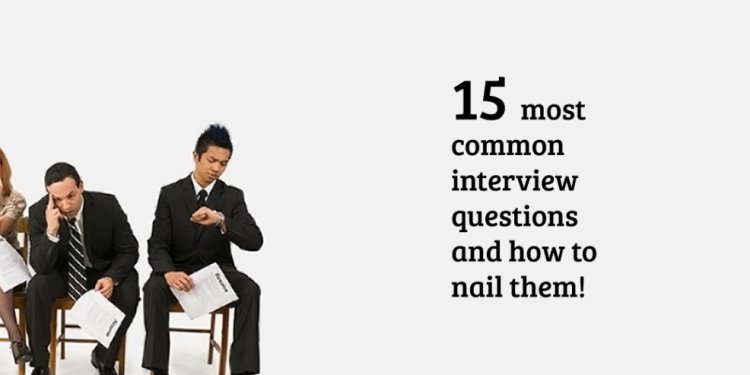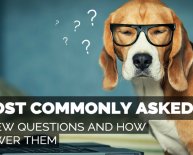
Most Common interview questions
There are some questions you're going to hear consistently in interviews—here's how to answer them.

Every interview has a unique focus, but some questions are asked so often, it makes sense to do all you can to prepare for them. In order to be successful, you need a strategy—not scripted answers. Your goal should be to emphasize the experiences in your background that best fit what each interviewer is looking for.
In this series, we'll look at some common interview questions and what you should consider when formulating your responses. Work through each potential question, creating your own responses, and you will be in great shape for your next interview. It helps to write out potential answers. Even better: Practice aloud with someone.
Intent: Such an innocent-sounding question, but it is a bit of a trap. The interviewer wants to see how you present yourself, but this is not an offer to recite your resume.
Context: This question, which when asked always occurs at the beginning of the interview, is a predictable opportunity to craft an engaging, intriguing executive summary of who you are professionally and why you are there. While there is no hard-and-fast rule as to how long it should be, let's say it should last up to a minute. If you are given this opportunity, turn it to your advantage to establish momentum.
Response: The stronger the connection you can make between your background, knowledge and interests, and the job at hand, the more compelling you will be as a candidate. If there is something notable about your personal life that adds to your candidacy or helps explain your career trajectory, add it. Otherwise, leave personal details out at this stage unless invited to do so.
Intent: This is a fairly open-ended question. At a basic level, the interviewer is interested in hearing how you both understand and articulate how you work. However, there may be a requirement for someone highly organized, or the team may have a specific way of working, and the interviewer wants to see if you fit.
Context: You may not have thought about this too carefully before. How do you best operate? What's the optimum work situation for you? There are two sides to this: How you work and in what kinds of work environments you work best. Are you highly structured? Do you focus on one thing and get it done, or move multiple projects forward concurrently? On the environment side, do you do best in fairly structured workplaces, or do you thrive in chaos?
Response: Like any other interview answer, being specific and backing up your answer with a brief example works best. You could use the past week as an illustrative example.
Intent: Fair question. Why are you? The interviewer knows you are looking for a new opportunity, and at a basic level, a job. Why else? A candidate with good reasons is going to be more interesting.
Context: This is not about telling them what they want to hear. Your reasons could involve opportunity, career fit, cultural fit, interest in their business, personal value proposition fit and your ability to be successful in the job. It's also a great opportunity to illustrate the research you've done on the company.
Response: You want to present your reason as a benefit to the employer. If it is the first interview, you might not have all the answers or will have not made up your mind yet. In this case, use a statement like, "From what I have seen so far."
QUESTION:Tell me about your proudest achievement.
Intent: This question, often worded as "significant accomplishment, " ranks among the most predictable and important things you'll be asked. Interviewers want to hear how you tackled something big. It is vital you give them an organized, articulate story.
Context: This is a behavioral question—meaning you're being asked to talk about a specific example from your professional history. Pick an example or story about how you handled a major project that is both significant to you and rich in detail.
Response: Set up the story by providing context. Recount the situation and your role in it. Next, discuss what you did, including any analysis or problem solving, any process you set up and obstacles you had to overcome. Finally, reveal the outcome and what made you proud.
QUESTION: Give me an example of a time when you had to think out of the box.
Intent: This is code for asking about your innovativeness, creativity and initiative. Interviewers want to learn about not only a specific creative idea but also how you came up with it and, more importantly, what you did with that insight.
Context: This is another behavioral question, and the example you select is critical. It should be relevant to the job you're interviewing for, and your impact in the story should be significant.
Response: Tell interviewers how you came up with a creative solution to a customer problem, improved an internal process or made a sale via an innovative strategy.
QUESTION: What negative thing would your last boss say about you?
Intent: This is another way of asking about your weaknesses.
Context: A good approach is to discuss weaknesses you can develop into strengths. However, do not say you work too hard or are a perfectionist. These answers are tired and transparent. Come up with something visible to a past boss that was perhaps mentioned in your performance reviews as a developmental area.
Response: "I don't think she would have called it negative, but she identified that I needed to work on being more dynamic in my presentation skills. I have sought out practice opportunities and joined Toastmasters. I have seen some real improvement."
QUESTION: What can you do for us that other candidates can't?
Intent: Some interview questions are more important than others. This is one of them. It's another way of asking, "Why should we hire you?"
Context: There are two nuances to this question. The first is asking you to compare yourself to other candidates—usually a difficult if not impossible task. More importantly, the interviewer is asking you to articulate why you are special. Your response should sum up your main selling points, related specifically to the job requirements.

















